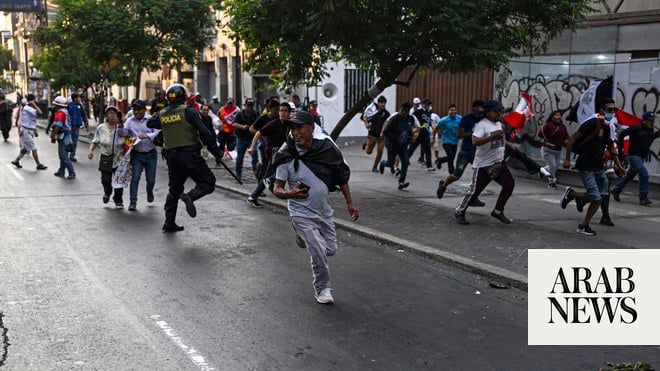
Tehran Prosecutor General Abbas Jafari-Dolatabadi announced on Tuesday that “several” protesters were arrested for rioting in the Iranian capital’s old Grand Bazaar on Monday.
They will not be released before they stand trial, he added.
Demonstrators had taken to the streets of Tehran on Tuesday for the third day to protest against the country’s deteriorating economy and sharp fall in the value of the national currency.
Online videos showed demonstrators again confronting police on Tehrans streets and alleyways. Similar confrontations had taken place on Monday where police fired tear gas at protesters near the parliament building.
Video footage posted on social media Tuesday showed protesters setting fire to garbage dumpsters in Tehran streets to block riot police from attacking them.
Other videos showed riot police breaking windows of closed shops and striking parked motorcycles with batons. The police has accused protesters in recent days of causing damage to public property.
Metro stations near the bazaar were closed for hours as the result of protests, state media reported.
Pictures also showed shopkeepers were on strike in other cities including Arak, Shiraz, Tabriz and Kermanshah.
The protesters chanted anti-government slogans in various commercial centers in the capital, said Reuters. They also protested against the regime’s meddling in regional affairs, with some demonstrators chanting “death to Palestine,” according to social media activists in Isfahan.
Tehran provincial court chief Gholam Hossein Ismaili, meanwhile, stated that the protesters in Monday’s rallies did not violate the economic system in the country, reported the Tasnim news agency.
In his first remarks on the unrest, President Hassan Rouhani promised Iranians on Tuesday the government would be able to handle the economic pressure, accusing the United States of standing behind his country’s economic woes in wake of its re-imposition of sanctions.
"We are fighting against the United States, it wants to make an economic war," he declared. "The US cannot defeat our nation; our enemies are not able to force us to their knees."
Iran has faced mounting economic problems since the United States in May pulled out of a 2015 nuclear accord between Tehran and world powers that lifted international sanctions in exchange for a scaling back of Iran’s atomic program.
The United States warned Tuesday that countries around the world must stop buying Iranian oil before November 4 or face a renewed round of American economic sanctions.
“Even in the worst case, I promise that the basic needs of Iranians will be provided. We have enough sugar, wheat, and cooking oil. We have enough foreign currency to inject into the market,” Rouhani stated in a speech broadcast live on state television.
Defending his economic record, he said the government’s income had not been affected in recent months, and the fall in the rial was the result of “foreign media propaganda”.
Parliament Speaker Ali Larijani, speaking at the same event as Rouhani, appeared to directly criticize his administration.
"The government hasnt done enough to confront the economic problems," the conservative politician said, according to the semi-official ISNA news agency.
MPs meanwhile held a closed-door session to discuss the fluctuations in the foreign exchange market and the protests, state news agency IRNA reported.
A week-long parliamentary break planned to start on Saturday has been scrapped, as lawmakers schedule further sessions to "resolve the economic problems" according to IRNA.
Apart from the rials collapse, the Iranian private sector has long been starved of investment and its banking system is crippled by bad loans.
Rage persists over the plunging of the Iranian rial to 90,000 to the dollar — double the government rate of 42,000 rials to $1 — as people watch their savings dwindle and shopkeepers hold onto some goods, uncertain of their true value.
Similar economic protests roiled Iran and spread to some 75 cities and towns at the end of last year, becoming the largest demonstrations in the country since the months-long rallies following the 2009 disputed presidential election.
The protests in late December and early January saw at least 25 people killed and nearly 5,000 arrested.












